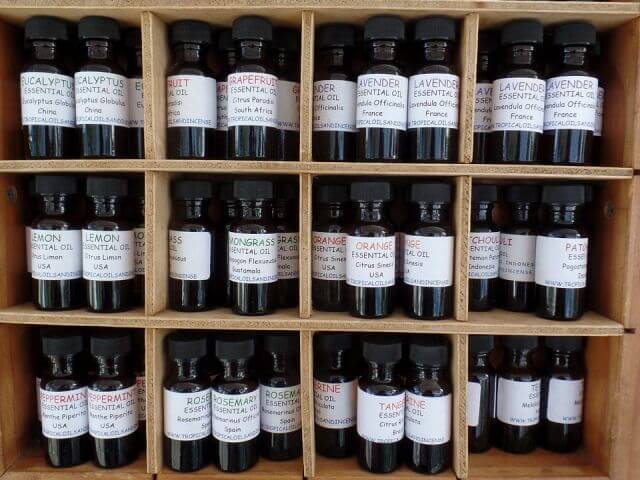This post contains affiliate links. If you click on a link and make a purchase I earn a commission at no extra cost for you.
Without plants, there would be no life on Earth. Plants produce oxygen that we breathe and plants are the basis of the food chain. Only plants can convert water and sunlight and minerals from the soil into plant material and fruit – food that all non-plant life depends on.
But in addition to green leaves and fruits, plants also produce secondary substances, so-called phytochemicals, which also include essential oils. These chemicals are important for the plant’s defense of communication.
What Is The Best Essential Oil To Repel Ticks?
There are many essential oils that can help to avoid ticks, there is no such thing as the best against ticks. Based on several studies I have compiled a list of the most effective tick-repellent essential oils. However, it cannot be said with certainty which oil is the number one natural tick repellent because all oils have different strong effects depending on the environment i.e. temperature, humidity, etc., how the oil is used and on which carrier it is used.
Oil of Lemon Eucalyptus
One of the most effective insect-repellent essential oils available is eucalyptus citriodora oil, a reliable natural compound derived from the lemon eucalyptus plant. Herbal extracts have long been used to repel biting insects.
Oil of lemon eucalyptus is an essential oil derived from the leaves and twigs of the lemon eucalyptus tree (Eucalyptus citriodora). It is used as an insect repellent and is known for its strong lemon-like aroma.
Oregano
Oregano essential has been regarded as the most effective oil in several studies. It contains cedrol that has the potential to kill ticks. However, oregano oil can be a skin irritant for some people. Make sure to dilute oregano oil in carrier oil and always do a patch test before applying it to the skin.
You can apply diluted oregano oil to your skin with a cotton ball. Or you can spray oregano oil mixture in carrier oil on your clothes, such as jackets, socks, trousers, or hats but do not use it on delicate fabrics that may stain. Never apply undiluted oregano oil directly to your skin it can cause irritation.
Eucalyptus
Eucalyptus essential oils is pleasant-smelling oil. It is highly effective in repelling ticks and other pests. Almost all essential oils can be irritating to some people so make sure to dilute with a carrier oil before applying it to your skin. If you are keeping pets, then avoid using eucalyptus essential oil try another repellent oil.
Cedarwood
Cedarwood essential oil is toxic to ticks. Cedarwood oil is one of the best essential oils to use as a tick repellent. Moreover, cedarwood oil is safe for people and animals when used as instructed. Iit added as an additive in many natural insect repellents.
Clove
Clove bud oil is another great tick repellent. The pungent odor of clove essential oil has a very strong repelling effect. To use clove oil as an insect repellent, add 10 to 15 drops of the oil into 1 ounce of water. You can also use clove oil as a topical oil by mixing it in a carrier oil such as coconut oil. Apply this oil on the bare skin using a cotton ball.
Red Thyme
Red thyme is effective at repelling insects because it contains a toxic ingredient “carvacrol” which is primarily responsible for its repellent action. Red thyme essential oil is a very concentrated oil that has antiseptic properties. The oil is obtained from the distillation of white thyme oil.
Never use red thyme oil at full strength because it can be irritant to some people. Always make sure to dilute before using. Add 4 to 5 drops of red thyme essential oil in 2 cups of carrier oil. Apply the diluted oil on the exposed areas of your skin.
Lavender
Lavender essential oil is a good tick repellent. It is safe to use as a topical oil for people of all ages and does not have any irritant effects.
Pennyroyal
Pennyroyal is a member of the Mint family. It works as an effective tick repellent. Pennyroyal essential oil should not be directly applied to human skin or pets. It can be applied to clothing, rugs, and cushions in the home. The application of pennyroyal essential oil will prevent the invasion of ticks in your home.
Neem Oil
Neem seed oil has a strong tick-repelling effect. It can also kill the ticks that come in contact with it. To use neem seed oil as a tick repellent, mix equal parts of neem oil in carrier oil. Apply the oil to the exposed areas of your skin.
Lemongrass
There are many types of lemongrass, some are great for cooking and make the curries particularly tasty. One type of lemongrass, Cymbopogon nardus, is used to extract citronella oil which is traditionally used in oil lamps to repel insects, or which is diluted with a carrier oil and applied directly to the skin. It is also used in soaps, shampoos, and lotions.
Geranium
Geranium has been used as an extremely potent repellent for ticks. It has a sweet and fruity scent, which most insects hate. Geranium can be applied directly to you or your dog’s collar. It also has anti-inflammatory and antiseptic properties.
Black cumin oil
or Blackseed oil (Nigella sativa) has a toxic effect on insects and ticks, the smell of it is deterring too many insects and arthropods
What Is Essential Oil?
Essential oils are mixtures of organic compounds extracted from plants or plant parts. Not all but most of the plant species produce essential oils that carry the plant’s natural flavor and aroma. These essential oils retain the natural smell and aroma of the plant. A unique composition of chemical compounds gives each essential oil its characteristic aroma.
Essential oils can be found in the roots, stems, leaves, flowers, or fruits of plants. The oils generally bear the name of the plant from which they are obtained for example “Rose oil”. The oils extracted from the plants have a wide range of uses, from aromatherapy and therapeutic applications to being used in natural insect repellents.

Extraction of essential oils
Essential oils are highly volatile compounds that are extracted through the process of distillation or other mechanical processes such as cold pressing. After extraction, they are mixed with the carrier oil to formulate a product that is ready and safe for use. The process through which an essential oil has been extracted is important because essential oils obtained through chemical processes are not considered true essential oils.
True essential oils are very expensive because a large amount of raw materials is required to produce just a few milliliters of oil. For example, to obtain a single drop of essential rose oil, approximately 60 roses are required, or to produce one pound of lavender, 220 pounds of lavender is required.
There are around 3000 known essential oils from various plants of which approximately 120 are commercially available as potential repellents and insecticides.
Why do plants produce essential oils?
Despite their name “essential oils” they are not essential for the plants to sustain their life activities. Plants produce natural compounds knowns as secondary metabolites. Essential oils are one product of the secondary metabolism process and can be highly beneficial for plants. They can have several functions in a plant:
- help to resist pathogens such as fungi, bacteria, and plant viruses
- for communication
- to attract beneficial insects
- protection from being eaten by insects and other animals.

Plants are susceptible to various environmental threats such as pathogenic microorganisms, animals, and insects that can damage or eat away the plant. Essential oils offer plants protection from predators by giving off a smell that repels potential predators, or it gives the leaves an unpleasant taste or even makes them poisonous, as is the case with tobacco, for example.
Also, interestingly, many essential oils have well-documented microbial properties. Through this antimicrobial effect, essential oils protect plants from microbial attacks. Many essential oils are toxic to other plants because they inhibit the process of photosynthesis and respiration. Therefore, they do not allow other plants to germinate in their environment.
But the opposite can also be the case, some essential oils have a very nice, appealing smell. Just like us humans, animals and insects can be attracted to the pleasant scent of plants. These fragrant scents given off by the flowers help attract insects for pollination or attract predators which attack the herbivorous insects nibbling on the plant.
It is thought that under harsh environmental conditions the essential oils accumulate on the surface of plant leaves and protect against loss of water.
How Do Essential Oils Repel Insects And ticks?
Many insects and ticks have a poorly developed optical perception or see very short distances. For these insects, the perception of the world and orientation in it consists of scent and smell.
Disruption of the sense of smell can deprive the insect of the ability to recognize a suitable host from which to feed blood. Simply put, for certain animals, the plant smells bad and tastes bad thanks to the essential oils.
In addition, some essential oils can also have a highly disruptive effect on the insect’s metabolism or even be fatal.

Are essential oils safe?
Essential oils are in general recognized as safe when used as instructed. However, they are very potent and many of the essential oils in their pure form can be irritating to the skin and therefore must be used diluted. Good vegetable oils such as coconut oil, olive oil, sunflower oil, or similar are best for this.
Essential oils must also not be consumed orally.
What essential oils repel ticks best?
Besides using synthetic tick repellents and/or essential oils as a tick repellent, there are some further measures you may consider. Controlling and reducing tick populations around your house and in your garden should be one of them. Various types of natural methods such as tick traps, tick repelling plants, and keeping the yard tidy, in combination with essential oil may provide a very effective way of tick control.
Benefits of Essential Oils For Pest Control
Research has shown that many of the essential oils act as natural pesticides. Certain oils have repellent effects on insects and arthropods. Depending on the oil, these effects are different and range from repelling, metabolic disruption, inhibition of growth or reproduction rate to the death of the insect pests.
Although not as effective as synthetic pesticides, essential oils have gained popularity in crop protection, pest control, and insect repellants such as bug spray.
Using essential oils as natural insecticides and pesticides instead of synthetic products has environmental benefits. More targeted applications are often possible without undesirable side effects such as contamination of groundwater and killing off many beneficial insects. In combination with organic pest control, essential oils are highly interesting for organic farmers and environmentally conscious consumers.
More to read:
Repellent activity of essential oils:
sciencedirect.com/science/article/abs/pii/S0960852409009468
Plant-based insect repellents:
ncbi.nlm.nih.gov/pmc/articles/PMC3059459/
Uses of Terpenes:
ncbi.nlm.nih.gov/pmc/articles/PMC7120914/



